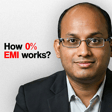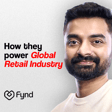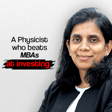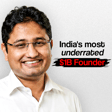
From Kolkata Streets to US Millionaire: Raution Jaiswal's Inspiring Journey
In this episode, Raution Jaiswal reveals how he built InsuredMine from $40,000 in funding to $5 million ARR, competing against giants like Salesforce in the US insurance agency software market.
Starting as an immigrant founder with no insurance background, Raution bootstrapped his way through the brutal early days, moonlighting while building his first product, pivoting from a consumer app to B2B CRM, and eventually capturing 17 of the top 50 insurance agencies in America.
He shared the journey in this candid conversation with host Akshay Datt. Raution breaks down his "Trojan Horse" go-to-market strategy, positioning InsuredMine as a friendly add-on to legacy systems before becoming the central hub of agency operations. He discusses why modern product architecture is his secret weapon, how he's embracing AI to move from automation to prescriptive intelligence, and why he chose to return to India after 18 years in the US to run his American business and give back through his foundation. This is a masterclass in vertical SaaS, capital efficiency, and contrarian company building in a massive but overlooked market.
Key Highlights:
👉How Raution built InsuredMine to $5M ARR with only $40K in funding, competing against Salesforce and legacy insurance software giants
👉The "add-on" Trojan Horse strategy that helps InsuredMine infiltrate agencies and become their central operating system
👉Why modern product architecture is InsuredMine's biggest competitive moat against billion-dollar competitors with legacy tech debt
👉Raution's pivot from B2C insurance wallet app to B2B agency CRM, and how he validated the business with 50 paying customers before quitting his job
👉How InsuredMine is leveraging AI to move from generative features to predictive analytics to prescriptive recommendations for insurance agents
👉Why Raution moved back to India after 18 years in the US to run his American business and launch his foundation for underprivileged students
Chapters:
00:00 - Raution Jaiswal's InsuredMine Origin Story
01:20 - US vs India Insurance Industry Landscape
05:25 - How Insurance Distribution Works in America
10:26 - The Problem InsuredMine Solves for Agencies
14:24 - Building CRM for Insurance Agency Market
17:25 - InsuredMine vs Legacy Agency Management Systems
20:54 - Why VCs Chase InsuredMine Despite Bootstrapping
24:33 - The $40K to $5M ARR Journey
27:24 - Scaling InsuredMine Without Venture Capital
29:03 - Bootstrapping Secrets and Capital Efficiency Playbook
32:09 - Managing US Business from India Strategy
35:41 - Product Evolution from Automation to AI
37:06 - Building World-Class Support at Scale
40:38 - Running Global SaaS Company from Bangalore
42:10 - From Kolkata Streets to US Entrepreneur
47:59 - Paying It Forward Through Education Foundation
50:59 - Building Trust-Based Sales Without VC Money
52:38 - Product Roadmap and AI CRM Vision
56:03 - AI Agents vs Human Insurance Agents
#InsurtechStartup #BootstrappedStartup #VerticalSaaS #InsuranceAgencySoftware #InsuranceCRM #SaaS #StartupIndia #FounderStory #USInsuranceMarket #InsuranceTechnology #AIinInsurance #StartupBootstrapping #IndependentInsuranceAgents #PropertyCasualtyInsurance #SalesforceAlternative #AgencyManagementSystem #InsuranceDistribution #CapitalEfficiency #StartupJourney #B2BSaaS #InsuranceInnovation #StartupPodcast
Disclaimer: The views expressed are those of the speaker, not necessarily the channel



















